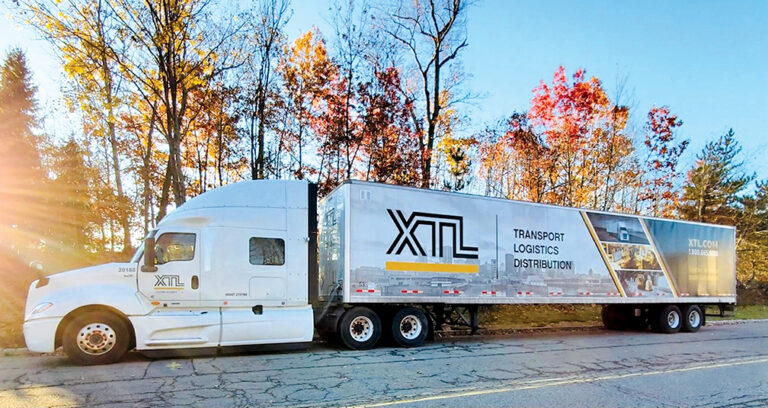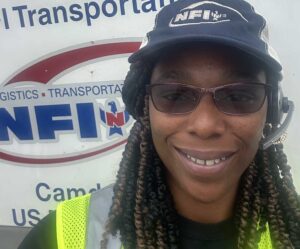Partnership is a word that is used often at XTL Transport. It’s used to describe relationships with customers, vendors, and team members at every level, according to COO Craig Germain.
“Our partnership approach is across our business,” he stressed. “If you look at our key customers, it’s longstanding, decades-long partnerships. If you look at our key suppliers, who we buy our equipment from, or the carrier partners we work with in our logistics business, we build good partnerships. And the last, but just as important, piece of that partnership approach comes down to our people.”
The company was founded in 1985 by current CEO Serge Gagnon, along with his father. From the beginning, Gagnon set the tone for the team.
“I’ll talk a lot about our founder because he is a very important part of the organization that he started back in ’85. As our CEO, he continues to provide the vision and remains actively involved in all facets of the business” Germain said. “I’ve been fortunate enough to work closely with him for three and a half decades.”
Explaining the management philosophy taught by Gagnon, Germain said, “We don’t build it and hope they will come. We take existing relationships and develop, expand, and maximize the offerings that we can bring them.”
Today, the company maintains its headquarters in Etobicoke, Ontario, Canada, a part of metropolitan Toronto. In addition to its carrier segment, XTL has added distribution and logistics segments.
“We have three distinct offerings — transport, which was the original TL company formed back in 1985; logistics, which is our transportation management piece; and then distribution, which has been the in the company pretty much from Day 1 but really took a bigger seat at the table in 2018,” Germain shared.
In July 2022, XTL opened its newest distribution facility in Calgary, Alberta. The new center complements those already located in Montreal, Toronto, and Vancouver.
Germain joined XTL in 1987, not long after its founding, beginning as a dispatcher and moving through a succession of roles. He was selected to lead the transportation management (logistics) division when it was created in 2002, and he assumed the role of COO for the XTL Group in 2019. He has been fortunate to be a part of much of the growth of the company.
“We’ve taken the base of a truckload carrier from Day 1, and today, we have evolved it into a full 3PL management company,” he remarked.
XTL’s partnership with its drivers took a large step forward when electronic logging devices (ELDs) became mandatory in the U.S. in December 2018.
“In 2018, when the ELDs came in and the whole industry had to do a better job of complying, we changed our highway mileage program to an hourly pay program,” Germain explained.
“That came from our owner, a strong visionary, and his logic was very simple,” he continued. “We have 70 hours to work with each driver each week — 55 of those driving and 15 on duty. It’s up to us to manage those hours to the maximum and not have the driver suffer for our inability to plan their work effectively, or for the things that can go wrong at the border and our customers.”
Changing to hourly driver pay wasn’t an easy transition for the company.
“It created a significant cost challenge,” Germain said. “From the get-go we had to tighten up our operation, and we had to look at our customer relationships and bring as much predictability as we could to the model. But we own that responsibility. We didn’t put that on the driver’s back.”
The result is an annual driver turnover rate that hovers around 30% — a rate that some other carriers of similar size might envy.
“We still find it too high at that level, so we continue to evolve our business offering,” Germain said. “A significant portion of our truckload offering is dedicated, and even with our irregular route and cross-border business, we try to bring as much consistency to the movements, so the driver knows what their week is going to look like.”
The company’s safety record benefits, too.
“You’ve got drivers in the marketplace paid by the mile, and the driver’s pay can be impacted by delays and so he or she has to make it up in mileage,” Germain explained. “Our drivers are assured, no matter what happens, whatever obstacles we’ve got to deal with, they’re paid by the hour.”
XTL hires experienced drivers but also partners with a highly qualified CDL school that trains new CDL drivers.
“We chose them because their training program is superior, and we happen to have the right operating model in that region. This model allows us to take brand-new graduates for in-cab training and then shadow them until fully qualified,” Germain shared.
“We do a lot of training, a lot of mentoring to develop the quality of driver we need,” he continued. “We’re always looking for experienced drivers — but at the same time, we know that the future success of XTL is about developing our own.”
Other core values the company adheres to are displayed on its website, xtl.com. Diversity in the workforce is very important to XTL. In fact, XTL boasts female representation at the management level exceeding 44%. The company has won multiple awards for its efforts to promote diversity.
Sustainability is another value at XTL. Like many carriers, the business model isn’t quite ready for electric- or fuel cell-powered over-the-road tractors, but the company has worked towards all-electric warehouse handling equipment and office improvements that conserve energy. In the fleet, sustainability is addressed by maintaining the most modern aerodynamic fleet. The average tractor age is a little over two years, and trailers average around five years.
“Probably the biggest thing in today’s trucking industry, until the electric advancement comes, is to run good fuel efficiency — and that’s something we’re extremely focused on,” Germain said.
Giving back to the community is another important value at XTL.
“We have a strong philanthropic spirit across our business, and we even have a little bit of competition amongst the various locations,” he noted. “The biggest thing is, it’s driven by our employees, supported by management, and that’s when you know it’s sustainable.”
The strategy employed during the COVID-19 pandemic was a little different at XTL.
“We kept offices across the country open,” Germain said. “Using the space we had and making investments in plastic dividers, spacing, mask & distance policies, etc., we were able to keep our business healthy, open, and operating effectively throughout the pandemic. The return to work challenge many businesses are facing now, is something we were able to avoid.”
Keeping offices open played a large role in supporting the partnerships with customers and employees Germain discussed. And those partnerships are expected to form the business foundation at XTL for years to come.
Cliff Abbott is an experienced commercial vehicle driver and owner-operator who still holds a CDL in his home state of Alabama. In nearly 40 years in trucking, he’s been an instructor and trainer and has managed safety and recruiting operations for several carriers. Having never lost his love of the road, Cliff has written a book and hundreds of songs and has been writing for The Trucker for more than a decade.








